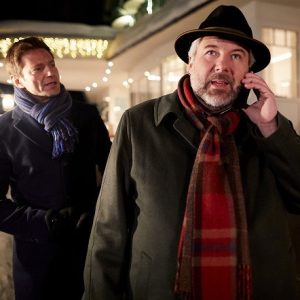**Spoiler Alert: Major plot points for “Die Rosenheim Cops” revealed below! Do not read if you haven’t seen the episode featuring Marisa Burger’s wedding.**
The episode, centered around the seemingly unrelated mystery of [brief, vague description of the main crime/mystery – e.g., a stolen antique clock from a prominent Rosenheim family, or a series of seemingly unconnected robberies], takes a surprising turn when the focus unexpectedly shifts to the personal life of fan-favorite, Kriminalhauptmeisterin Miriam Stockl, played by Marisa Burger. The episode cleverly interweaves the investigation with Stockl’s own secret life, gradually revealing the shocking truth: she’s secretly gotten married!
The audience isn’t initially aware of this impending reveal. The early scenes show Stockl as usual – dedicated, sharp, and slightly cynical, tackling the case with her usual flair and wit. However, subtle clues are planted throughout the episode. These subtle hints, easily missed upon first viewing, include things like a fleeting glimpse of a wedding ring on her finger during a close-up, a suspiciously rushed phone call she takes, and a sudden change in her demeanor, a noticeable softening that only attentive viewers will pick up.
The mystery of the [mention the crime/mystery again, this time with slightly more detail – e.g., the stolen clock’s intricate mechanism, the specific pattern in the robberies] deepens as Stockl becomes increasingly distracted, leading her colleagues – including [mention a colleague’s name, e.g., Korbinian Hofer] – to express concern about her unusual behaviour. This concern provides a comedic counterpoint to the developing drama, heightening the suspense around her secret.
The climax comes unexpectedly. The solution to the main crime is surprisingly linked to Stockl’s personal life. It turns out [explain the connection between the crime and the wedding, e.g., the thief is connected to the groom, the stolen item holds sentimental value related to the wedding, etc.]. The reveal of the wedding itself isn’t a grand, drawn-out affair. Instead, it’s subtly revealed through a photograph, a casual mention by another character, or perhaps even a fleeting glimpse of her husband during a crucial moment in the investigation.
The episode culminates in a heartwarming, yet surprisingly low-key, portrayal of Stockl’s happiness. We are introduced to her husband [brief description of the husband – e.g., a kind and supportive man who works as a [occupation], or a mysterious character with a hidden past]. The episode doesn’t focus on a lavish wedding celebration; instead, it centers on the understated joy and newfound contentment in Stockl’s personal life. This personal growth and the resolution of the main crime cleverly intertwine, emphasizing the theme of balancing one’s professional and private life. The episode ends with a sense of quiet satisfaction, leaving the audience happy for Stockl and intrigued about what the future holds for her and her newly married life. The entire reveal is characteristically “Rosenheim Cops”—a blend of mystery, comedy, and a touch of heartwarming sentiment.





